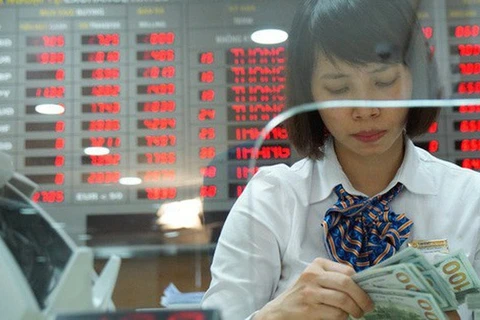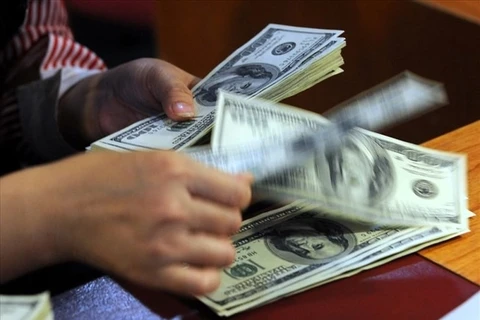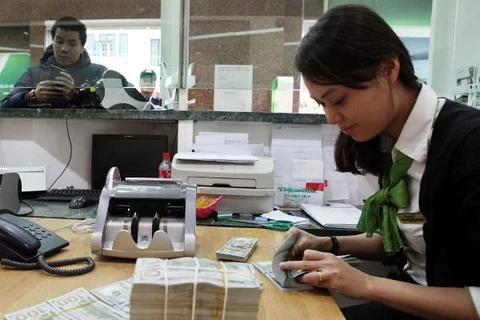Hanoi (VNA) – Prices of gold, real estate and stocks would be pushed up by the US Federal Reserve (Fed)’s decision to reduce interest rates, a move that tends to make the US dollar lose value against other foreign currencies, according to insiders.
Fed has announced to cut interest rates for the first time in a decade. In an effort to sustain the US economy’s longest expansion on record, Fed lowered the interest rates by a quarter-percentage-point on July 31, bringing the target range for the Federal funds rate to between 2 percent and 2.25 percent.
Following Fed’s move, experts believed that Vietnamese interest rates may be adjusted down in several prioritised sectors. However, the interest rates could hardly be lower than the prevailing rates.
Banking and financial expert Nguyen Tri Hieu said Fed’s interest rate cut would not affect Vietnamese rates right away as they are at high level of 7-9 percent for short-term loans, and 9-11 percent for medium- and long-term loans.
However, he said, in the long-term, Fed’s cut will reduce pressure on Vietnamese dong devaluation. “We are relying much on exports, and it is necessary to lower exchange rates to support shipments. Fed wants lower rates to keep down the US dollar; however, it does not mean there should be a currency devaluation drag on the Vietnamese dong so as to create stability for the Vietnamese dong.”
Prices of gold, real estate and stocks would be pushed up by the US Federal Reserve (Fed)’s decision to reduce interest rates, a move that tends to make the US dollar lose value against other foreign currencies, he said.
“Dow Jones dropped on the unsettled US-China trade war, not Fed’s interest rate cut. I think the securities, gold and property markets as well as other economic sectors will feel the impact of Fed’s rate cut in the time ahead. In this way, Vietnam’s gold market could see price rise while the realty market could maintain its stability…”, Hieu analysed.
Meanwhile, economist Le Xuan Nghia said lower borrowing costs in the US results in devaluation of the US dollar. If the Vietnamese dong moves in tandem with the US dollar, the VND/USD exchange rate will not change dramatically but Vietnam may lose export advantages in many other markets.
Fed’s rate cut also put pressure on the exchange rates between the Vietnamese dong and other foreign currencies. Besides, other countries may follow the trend by loosening their monetary policy, posing huge risks for inflation in the long term. Particularly in the context of global trade downturn, an increase in money supply could lead to a higher risk of rising inflation. Therefore, Vietnam needs to outline measures in the medium term, Nghia recommended.
Experts from the Bao Viet Securities Joint Stock Company said the Fed Chairman did not affirm the cut in interest rates in July that means the cut would last for a long time, making the central banks in emerging markets stay prudent in their interest rate decisions in the future.
Rate setters in several countries such as India, Malaysia and the Philippines had lowered borrowing costs to blunt the headwinds from the global economic recession as Fed pivoted away from a tightening bias to “pause mode” when it comes to monetary policy from the outset of the year.
In their recent meetings, the central banks decided to turn on the wait-and-see mode, which means they could wait for Fed’s move before making interest rate decisions instead of early actions like they did in the first half of the year.
In mid-July, the State Bank of Vietnam reduced the interest rate of the treasury bill by 0.25 percent to 2.75 percent. Investors described it as a step to loosen the monetary policy.
The cut could partially encourage lending in theory but it may not have a huge impact in practice. The Bao Viet Securities experts explained Vietnam manages its monetary policy through credit growth ceiling and total payment growth, and not indirectly through the adjustments of interest rates.
“Based on current developments, we believed that interest rates in Vietnam may be adjusted down in several prioritised sectors; however, it is fairly difficult to set up a lower interest rate”, an expert from the company stressed.
Other experts also forecast the VND/USD exchange rate may increase slightly, from 1-3 percent until the end of the year./.

























